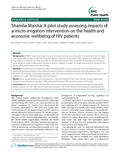| dc.contributor.author | Pandit, JA | |
| dc.contributor.author | Sirotin, N | |
| dc.contributor.author | Tittle, R | |
| dc.contributor.author | Onjolo, E | |
| dc.contributor.author | Bukusi, EA | |
| dc.contributor.author | Cohen, CR. | |
| dc.date.accessioned | 2013-06-12T14:25:39Z | |
| dc.date.available | 2013-06-12T14:25:39Z | |
| dc.date.issued | 2010 | |
| dc.identifier.citation | Shamba Maisha: a pilot study assessing impacts of a micro-irrigation intervention on the health and economic wellbeing of HIV patients. Pandit JA, Sirotin N, Tittle R, Onjolo E, Bukusi EA, Cohen CR. BMC Public Health. 2010 May 11;10:245. doi: 10.1186/1471-2458-10-245. | en |
| dc.identifier.uri | http://www.ncbi.nlm.nih.gov/pubmed/20459841 | |
| dc.identifier.uri | http://erepository.uonbi.ac.ke:8080/xmlui/handle/123456789/32438 | |
| dc.description.abstract | HIV/AIDS negatively impacts poverty alleviation and food security, which reciprocally hinder the rapid scale up and effectiveness of HIV care programs. Nyanza province has the highest HIV prevalence (15.3%), and is the third highest contributor (2.4 million people) to rural poverty in Kenya. Thus, we tested the feasibility of providing a micro-irrigation pump to HIV-positive farmers in order to evaluate its impact on health and economic advancement among HIV-positive patients and their families.
METHODS:
Thirty HIV-positive patients enrolled in the Family AIDS Care and Education Services (FACES) program in Kisumu, Kenya were provided a micro-financed loan to receive an irrigation pump and farming guidance from KickStart, the developer of the pump. Economic data, CD4 counts, household health and loan repayment history were collected 12 months after the pumps were distributed.
RESULTS:
Mean annual family income increased by $1,332 over baseline. CD4 counts did not change significantly. Though income increased, only three (10%) participants had paid off more than a quarter of the loan.
CONCLUSIONS:
We demonstrated the feasibility of an income-generating micro-irrigation intervention among HIV-positive patients and the collection of health and economic data. While family income improved significantly, loan repayment rates were low- likely complicated by the drought that occurred in Kenya during the intervention period. | en |
| dc.language.iso | en | en |
| dc.title | Shamba Maisha: a pilot study assessing impacts of a micro-irrigation intervention on the health and economic wellbeing of HIV patients. | en |
| dc.type | Article | en |
| local.publisher | Obstetrics, Gynecology and Reproductive Sciences, University of California San Francisco School of Medicine, USA | en |

